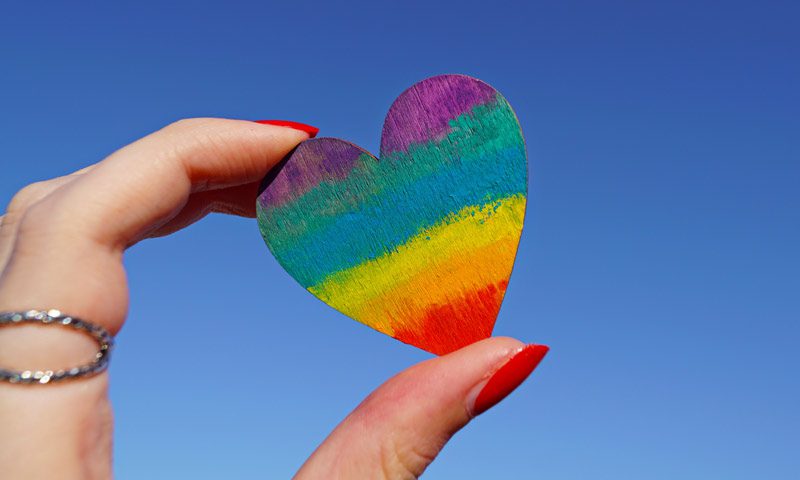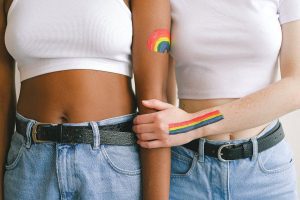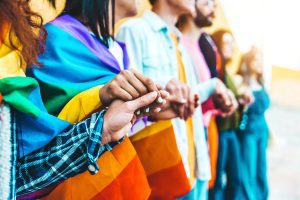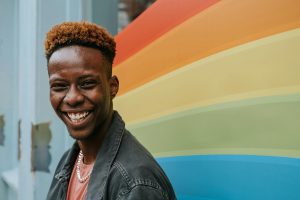Hi, my name is Lori. I am a parent of three kids with three different expressions of gender and sexuality. And I have been a registered nurse since 1997, my preferred specialty being pediatrics. My kids have the same father and were raised in the same home, with the same values, in a safe environment. Incidentally, they have an aunt who identifies as gay on their father’s side. So why do my children identify separately as heterosexual, homosexual, and transgender?
Parent-child relationships (“nurture”) significantly impact how children develop and identify themselves (Mills-Koonce et al., 2018). Considering that, how much of a role does genetics (“nature”) play? What ultimately determines whether a child identifies as straight or gay?
Nature Versus Nurture
The nature versus nurture debate has been around for centuries, and it is still one of the most controversial topics in medicine. Nature refers to the innate characteristics we are born with; for example, eye color. In contrast, nurture refers to the effect of personal experiences, often referred to as “environment,” such as how others treat us during our lifetimes. (Sravanti, 2017) The age-old debate of nature versus nurture (no consensus on this issue yet) remains an integral part of scientific inquiry, providing a framework for understanding how individual differences arise. (Mills-Koonce et al., 2018)
Many scientists have hypothesized that homosexuality starts in the womb and are working to identify the specific genes and environmental experiences that contribute to developing various traits. (Norton, 2012) Traits and experiences that lead one person to be out and confident and another to be a closeted homophobe are some of the differences under consideration by scientists. It currently appears that genes and the environment both play a role in shaping who we are. (Sravanti, 2017), but let’s look at that as I share my personal and professional experiences.
All three of my children are amazing people, and I love them dearly. Still, I clearly remember the day my middle child, “Mariah,” for the sake of this article, came out to me. I was so proud of her for being brave and honest about who she was. “Mom, I’m gay.” Of course, I immediately asked the crucial question—was she happy? Mariah said, “Yeah, but…can you tell Grandma and Grandpa?” I had to laugh because I knew they would accept her just as she was. Still, inwardly I cringed, thinking about how other kids would choose not to reveal their identities to their parents because of issues surrounding homophobia, abuse, and ignorance.
How Nurture Can Hurt
Many children experience trauma, hostility, and mistreatment when they come out to the family. Many gay, transgender, and cisgender individuals stay “in the closet” out of fear of being judged or rejected. (Mills-Koonce et al., 2018)
My first experience around anyone gay was in high school when I discovered that one of my best friends was gay. Nature was how he intrinsically knew who he was from the start. He was born that way. He had always been “just Steve” to me, but he hid who he was from his family and most of his friends for decades. When he finally chose to come out, his family practically disowned him, which is a prime example of how nurture can hurt someone. Furthermore, it shows the decision-making path that leads to the choice to pretend to be straight.
How Nurture Can Help
My youngest child, we will call them “Justin,” had a lot of difficulties figuring out precisely who they were. At first, they came out as gay, but their brother and sister didn’t think that was all of it, and BINGO! A few years later, on high-school graduation day, they celebrated in more than one way by coming out as transgender!
Justin had always felt like they didn’t fit in with the girls or boys but always said they were a “tomboy” compared to other girls in class. During their last year at high school, these feelings became more formalized into something approaching an identity in which they came out as transgender. Mariah’s relatively problem-free introduction into society as gay was a massive factor in Justin’s decision to make their declaration public and celebrate it.
The experiences Justin focused on contain elements from both sides of the debate. The need for belonging leads some individuals down paths where they can find what Mariah and Justin received unconditionally. Justin’s challenge to identify was nature and nurture. Studies have found that “life experiences can affect how genes are expressed” (Sravanti, 2017).
Did it begin at birth? Did the observed reactions to family behaviors trigger another gene to be expressed later? Maybe a combination of multiple genes led to the final result?
Nature Versus Nurture in Sexuality
Some scientists believe that genes determine sexuality. In contrast, others believe that environment and experience are the key factors. The truth is probably somewhere in the middle. Both nature and nurture likely play a role in sexuality. However, the relative importance of each is still unknown. (Norton, 2012) Here, the nature versus nurture debate is particularly relevant. Major scientific research on this topic happens daily, and there is still no consensus about what causes someone to be gay, lesbian, bisexual, or transgender. (Mills-Koonce et al., 2018).
During my career as a registered pediatric nurse, I met and worked with so many different kinds of people of all sexualities and gender identities. In those 25 years, I have learned that sexuality and gender identity are fluid things and that not everyone experiences them in the same way. I believe that each person is born with a certain sexual orientation. Still, I accept how the environment influences the expression of orientation.
I feel that sexual orientation is not a choice. My views were altered somewhat by research and years of personal experience as an RN and a parent. I have seen first-hand how a person’s circumstances can influence sexual orientation. For example, if children feel unsafe, have been abused, or think others won’t accept who they are, they may be more likely to repress their true desires.
Conclusion
I have three children with three different sexual orientations, but I am a proud Mama of my children for being their authentic selves. It hasn’t been easy for them, but they have handled everything with grace and courage, and each kid brings something unique to our family blend. We are so lucky to have them in our lives.
I hope that someday, everyone will see that LGBTQIA+ people are just “people” and will quit saying they are “like us.” They are us. We are all HUMAN. We all have genes, and we all have experiences that we draw upon in our decision-making.
Ultimately, we live in a time of more understanding and acceptance than ever. Through stories like mine, continued education on the topic, and dialogue between people of all backgrounds, we can move closer to true equality for everyone.
Do you have any thoughts or experiences you would like to share? I’d love to hear them! Please head to my mental health blog, Story of Lori, or grab my contact information below.
If you or someone you know experiences mental health issues, it is important to seek help from a qualified professional. Our Resource Specialist can help you find expert mental health resources to recover in your community. Contact us now for more information on this free service to our users.

Find the Story of Lori:
Pinterest: https://www.pinterest.com/astoryoflori/
Facebook: https://www.facebook.com/profile.php?id=100086676214734m
Instagram: https://www.instagram.com/storyoflori1/
Twitter: https://twitter.com/StoryofLori
References
- Mills-Koonce, W. R., Rehder, P. D., & McCurdy, A. L. (2018, September 28). The Significance of Parenting and Parent-Child Relationships for Sexual and Gender Minority Adolescents. Retrieved November 11, 2022, from https://www.ncbi.nlm.nih.gov/pmc/articles/PMC7087348/.
- Sravanti, L. (2017). Nurture the nature. Retrieved November 11, 2022, from https://www.ncbi.nlm.nih.gov/pmc/articles/PMC5659093/.
- Norton, E. (Ed.). (2012, December 11). Homosexuality may start in the womb | science | AAAS. Homosexuality May Start in the Womb. Retrieved November 11, 2022, from https://www.science.org/content/article/homosexuality-may-start-womb
Photo by Marta Branco: https://www.pexels.com/photo/person-holding-multicolored-heart-decor-1173576/
The opinions and views expressed in any guest blog post do not necessarily reflect those of www.rtor.org or its sponsor, Laurel House, Inc. The author and www.rtor.org have no affiliations with any products or services mentioned in the article or linked to therein. Guest Authors may have affiliations to products mentioned or linked to in their author bios.
Recommended for You
- How to Stop Nail Biting: What Finally Worked for Me After Years of Failed Attempts - December 26, 2025
- Dealing With Toxic Family Members: A Survival Guide for Family Gatherings - December 22, 2025
- When to Seek Help from a Child Psychiatrist: 6 Signs Your Child Needs Support - December 19, 2025





